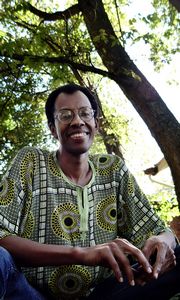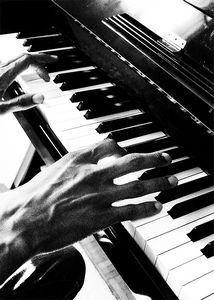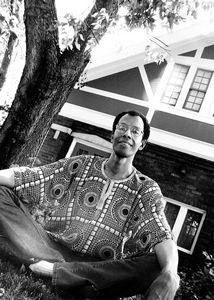social bookmarking tools:
 |
|
| Available RSS Feeds |
|---|
 - Top Picks - Top Picks |
 - Today's Music - Today's Music |
 - Editor's Blog - Editor's Blog
|
 - Articles - Articles
|
Add Louisville Music News' RSS Feed to Your Yahoo!
|

IN THE MOMENT WITH HARRY PICKENS
April, 1997: I'm in the Clark-Todd Recital Hall at the Kentucky Center on a Sunday afternoon, two months into my beat as "Jazzin'" columnist for this newspaper. It's a sold-out performance for one of the center's Jazz Cabaret Series. Every seat around the circular tables that fill the floor is occupied. In a corner in the back of the hall, steam pans line tables covered in white linen with pleated maroon fabric that drapes down the fronts. The smell of food wafts from them. In another corner, people are gathered around the cash bar. The hall is dark, lighted only by the candle centerpieces on each table and the spotlight-washed performance area against the opposite wall, where the afternoon's performers are doing the last-minute tweaks to their instruments.
I take a sip of coffee. My notepad is next to the saucer, pen slanted on top of it. Next to me is Louisville jazz pianist Steve Crews. I'd known Crews since I first saw him in Soundchaser, the quartet he formed with saxophonist Ron Jones, bassist Butch Neeld and drummer Hugh Griffin, when they played in the Top Cheese Lounge, the "Birdland of the South," as Crews called it, in the upstairs room over Kaelin's Restaurant. He was one of the first people I had called after LMN Editor-in-Chief Paul Moffett invited me to step in to write the column and cover jazz in the city. As much as I liked jazz, Crews was the only jazz musician in town I knew personally. He was my initial link to the rest of the city's jazz community. And I was glad he and I ran into each other that afternoon at the cabaret. I needed color commentary to help fill the blank pages in notepad.

We joked in low voices, like announcers at a golf game on television, about the trio setting up in front of us: vibraphonist and drummer Dick Sisto, bassist Tyrone Wheeler and an exceptionally tall, beanpole of a pianist, who was to be the subject of my next column. I had learned he was from San Diego, tight with several jazz luminaries like Milt Jackson and Benny Golson and had spent several years performing in New York City, the kind of journeyman experience other musicians would offer up a vital organ or two to have. He had also been offered a recording contract with Blue Note, the one record label most synonymous with jazz.
And now he was in Louisville, getting ready to move here and add his name to the small list of jazz musicians already playing in town.
After a brief introduction, the trio began their first number. Crews and I were focused on the music. Others at our table were focused on each other, chatting in between chewing bits of their hors d' oeuvres. At the table behind us, someone laughed. My concentration drifted from the jazz trio to the snatches of ambient noise that floated from the other tables. The applause was generous after the trio finished, but the noise returned when they started into their second song. I glanced at the piano player. His face was grim and tense.
The third selection was a solo piece from the pianist. In a resonant voice he told us what it was, then started playing. Off to my left, a group at a table toward the back sounded as if they were playing a round of Yahtzee in someone's living room.

The pianist abruptly stopped. He leaned toward the microphone next to him. Crews drew in a short breath and whispered, "Uh-oh."
"We'll wait until all conversations have finished themselves," the pianist said firmly but calmly, the voice of a parent getting ready to deliver the Lecture of the Week to a group of misbehaving children.
The pianist then gave a brief homily about being in the moment with music, about the magic than can happen when you focus on what the performer is doing, about letting the sounds flow through and around like friendly ghosts, about how that opens your heart to the possibilities of love and the power of dreams.
And about how it keeps from pissing off the piano player. So, basically, the people talking need to just shut up.
October 2005: Eight years later, the pianist, 45-year-old Harry Pickens, laughs long and loud and shakes his head at that story. "Oh, God," he said with a grin. "I'm not used to hearing people talk while I play. It's like praying in public. It's kind of like a visual artist working on a painting and somebody's shining a strobe light on them. It's an auditory form and there's a certain sacredness to that."
We were in the living room of Pickens' cozy home in the Highlands. A floor-to-ceiling bookshelf covered the wall opposite where we sat, every inch taken up by enough of a variety of books to start a small library. Against another wall, a black upright piano, its surface polished to a mirror shine. Pickens sat in an aluminum dining room chair behind the monitor of his Macintosh. When he sits, his kneecaps are higher than his waist. When he stands to move to his piano or to pull something from his bookshelf, the top of his head almost touches the ceiling.
Pickens continued his explanation on his need for quiet during a performance. "It's part and parcel of the context in which jazz and other popular music evolved in this country: as background music. Heck, even Handel and Mozart wrote background music. When I am in a performance mode, it's like my hearing gets much more acute. It's very odd. I just live in a different context. It's not background music for me and for the people who come. And depending on where you're playing and what the context is, sometimes that's kind of an unusual perspective."
Born in Brunswick, Georgia, in the southwestern corner of the state, Pickens originally attended Davidson College, a small, selective Presbyterian liberal arts school in North Carolina, as a pre-med major, but found he was spending more time in the piano practice rooms than in the biology lab. After two years at Davidson, he transferred to Rutgers University, specifically to be close to New York City and study with pianist Kenny Barron.
"It was a wonderful time to be at Rutgers," Pickens said. "In the big band was Terence Blanchard and Ralph Peterson, folks of that caliber. By the time I was 20 years old, I was working part time in New York, playing at the Village Vanguard, Sweet Basil's, Avery Fisher Hall a few times. I worked with Freddie Hubbard, Milt Jackson, toured with Johnny Griffin for a couple of years."
His voice trailed off and became softer. "It really feels like ancient history now because I'm not focused in that direction so much anymore."
Pickens remained in New York for several years before moving to San Diego in 1987. And he stopped performing. "There were a number of people who thought I was crazy," he said. "I was offered a solo contract with Blue Note records, I was working with Milt Jackson and was subbing with the Benny Golson Jazztet, working with a lot of people. There were two things going on. I was married at the time and [my wife] had health issues and northeast winds were difficult [for her]. But I had also become thoroughly disenchanted with the fact that because of the nature of the context of the music I had chosen to play, more often than not I was playing music in environments that I wouldn't necessarily choose to be part of."
No, he wasn't hammering on a piano as part of a strip club combo. He was playing in places where there was smoke and, most important to Pickens, where people were there for things other than music.
"And I made a decision at that point," he continued, "because the act of making music is so sacred to me and because my relationship to music was sacred, I would no longer put myself in situations where the music was not respected."
Several years later, after his marriage ended, Pickens made a decision to move to Louisville, not just to play but to be closer to his mother, who had moved to Harlan County to live with her sister. Now visits to his mother would only be a three-hour drive instead of a four-hour plane trip. In February 1998, during Jazz Week at the University of Louisville, he made a live recording of a number of songbook standards that would be released in 1999 as Passionate Ballads on Jamey Aebersold's Double-Time Records and he became a regular instructor at Aebersold's jazz camps at U of L. But even though he and Louisville seemed to be a good fit, Pickens' health, both physical and mental, was not good. And it put him on an unexpected sabbatical.
"In 1998, I lived in a house in San Diego with toxic mold," he explained. "I was chronically ill for five years, including part of the time I was here in Louisville. I had hit my head a couple of times, an occupational hazard of being six-foot-nine in a five-foot-four world and the worst of it was I had lost a lot of fine motor coordination. I couldn't play the piano, I certainly couldn't play well. At the very worst of it, in August, 1998, it took me fifteen minutes to find a C-major scale. My mind was just not functioning right. In December, 1998, for the bulk of that month, I did two things everyday: I went to the bathroom and ate.
"So I went through a period of four or five years where I really did not know and really wondered if I would ever be able to play again."
But when he did start to play again, toward the end of 2003, Pickens had the kind of experience that edged into the ecstatic, the kind you feel when a dear friend you thought had fallen off the planet gives you a phone call one day.
"I was flooded with such a sense of appreciation," he said, "and so now whenever I play the piano, there's a sense of the miraculous because it was taken away from me for years. And I would say for four of those five years, I did not believe I would be able to play again and I'd have to grieve it and let it go completely."
To have surrendered music would not only have affected Pickens as a musician, it would have left a large part of his second career empty. As an organizational consultant, Harry Pickens is one of the people a company brings in to help with the softer aspects of business. He's not a motivational speaker who drops platitudes in every other sentence while bounding about the room like an overactive puppy (minus the drool and a pause to relieve himself on the floor), nor does he take employees on his own private tour of Spreadsheet-and-PowerPoint Hell without providing any kind of connection between one fact and another figure. Nor is he the brusque guy a company brings in to thrash employees' psyches around to get them to cowboy up and do what needs to be done, so you'll never hear him bark, "Coffee is for closers only."
Instead, Pickens' work with companies focuses on conversations, which he says are the DNA or any organization, building relationships that get results, creating teams. In short, the softer skills that many organizations lack and that actually underlie their daily business, the stuff that can drive a company toward greater success or start driving employees away.
And music plays a big part in what he teaches. It is the one tool to which everyone can relate.
"Most of the organizations I've connected with," he said, "operate in such a way, through policies and procedures, systems, leadership interactions, or whatever, that create lids on human potential. A person might have range of capacity and as a result of the various aspects of institutional structure, we find very little of that capacity gets expressed. One reason is that, very often, people are not operating out of their strengths."
Pickens rose from his chair and moved to his piano.
"For example," he said, "the difference between Errol Garner. . . .
Pickens began to play the first verse of Gershwin's "They Can't Take That Away from Me," in a bouncy staccato swing.
"Or Thelonious Monk. . . ."
He played the same bars, but this time with lots of clumsy plunks on the keys, two discordant notes played together and a set of four triplets squeezed into four beats.
"Or Bill Evans. . . ."
Here Pickens played the same bars again, this time slowly and smoothly, sweeping, romantic.
"We call it style. Style is not something you figure out intellectually, but it emerges from what you are in terms of your particular gifts and talents and passions and interests."
He spread out his fingers. "I have really big hands," he said, "and it took me a long time to realize they were really a great advantage because I can play chords other human beings can't reach. That comes out of my recognizing my particular strengths and incorporating them."
While it might be difficult for Pickens to drag his upright piano into the conference room of an office building (and there's a good chance there isn't one already there waiting for him), he can still use music as a tool to illustrate his points and it all fits within his work as a musician.
"It has taken me the bulk of my life," Pickens said, "to really get clarity on a search that I think most people experience. Richard Bolles, [author of] What Color is Your Parachute, wrote `You find your sense of purpose or calling at the place where your gifts meet the world's hunger.' I finally understand that the essence of what I do is to use music and words to mobilize people to positive action. Music is one way that the message gets communicated."
As a professional musician, Pickens wants to deepen his capacity to create beauty. He already has several improvised solo piano concerts in the works. He's writing songs and wants to get a songbook published containing what he calls "Adult Sesame Street songs," which means it might have "Who is that Jackass in the Cubicle," a grown-up version of "Who are the People in Your Neighborhood." Most like it won't since Pickens' work with organizations is about building relationships and capabilities, not running them through a shredder.
"I want to deepen my capacity to live as an instrument of good in the world," he said. "That metaphor is very real for me, because in my own spiritual path, I feel like the purpose of life is to use your gifts and talents and skills to be an instrument creating a better world, a more compassionate world."
"There's a story about Vincent Van Gogh," Pickens said. "When he was very young, he lived, I think, in London. I'm not sure. He was writing a letter to his brother and he looked outside and there was a full moon. And the moonlight was beaming down on the street, illuminating it. He was struck by the beauty of the scene. He turned his letter over and drew a picture of that street scene. And he wrote, `This is so beautiful, I had to share it with you.'
"That's the reason I make music. For me, my purpose is to convey something of deep beauty. And to share it."
Be in the moment with Harry Pickens at www.harrypickens.com.
